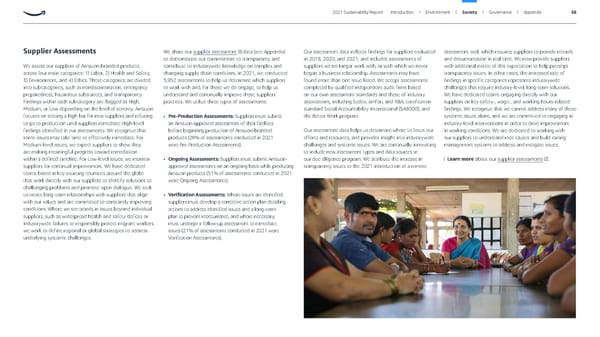Supplier Assessments We assess our suppliers of Amazon-branded products across four main categories: 1) Labor, 2) Health and Safety, 3) Environment, and 4) Ethics. These categories are divided into subcategories, such as nondiscrimination, emergency preparedness, hazardous substances, and transparency. Findings within each subcategory are flagged as High, Medium, or Low depending on the level of severity. Amazon focuses on setting a high bar for new suppliers and refusing to go to production until suppliers remediate High-level findings identified in our assessments. We recognize that some issues may take time to effectively remediate. For Medium-level issues, we expect suppliers to show they are making meaningful progress toward remediation within a defined timeline. For Low-level issues, we monitor suppliers for continual improvement. We have dedicated teams based in key sourcing countries around the globe that work directly with our suppliers to identify solutions to challenging problems and promote open dialogue. We seek to create long-term relationships with suppliers that align with our values and are committed to constantly improving conditions. Where we see trends in issues beyond individual suppliers, such as widespread health and safety deficits or industrywide failures to responsibly protect migrant workers, we work to define regional or global strategies to address underlying systemic challenges. We share our supplier assessment data (see Appendix) to demonstrate our commitment to transparency and contribute to industrywide knowledge on complex and changing supply chain conditions. In 2021, we conducted 5,952 assessments to help us determine which suppliers to work with and, for those we do engage, to help us understand and continually improve those suppliers’ practices. We utilize three types of assessments: • Pre-Production Assessments: Suppliers must submit an Amazon-approved assessment of their facilities before beginning production of Amazon-branded products (28% of assessments conducted in 2021 were Pre-Production Assessments). • Ongoing Assessments: Suppliers must submit Amazon- approved assessments on an ongoing basis while producing Amazon products (51% of assessments conducted in 2021 were Ongoing Assessments). • Verification Assessments: Where issues are identified, suppliers must develop a corrective action plan detailing actions to address identified issues and a long-term plan to prevent reoccurrence, and where necessary, must undergo a follow-up assessment to remediate issues (21% of assessments conducted in 2021 were Verification Assessments). Our assessment data reflects findings for suppliers evaluated in 2019, 2020, and 2021, and includes assessments of suppliers we no longer work with, or with which we never began a business relationship. Assessments may have found more than one issue listed. We accept assessments completed by qualified independent audit firms based on our own assessment standards and those of industry associations, including Sedex, amfori, and RBA; certification standard Social Accountability International (SA8000); and the Better Work program. Our assessment data helps us determine where to focus our efforts and resources, and provides insight into industrywide challenges and systemic issues. We are continually innovating to include new assessment types and data sources in our due diligence program. We attribute the increase in transparency issues to the 2021 introduction of a remote Learn more about our supplier assessments . assessment tool, which requires suppliers to provide records and documentation in real time. We now provide suppliers with additional notice of this expectation to help preempt transparency issues. In other cases, the increased rate of findings in specific categories represents industrywide challenges that require industry-level, long-term solutions. We have dedicated teams engaging directly with our suppliers on key safety-, wage-, and working hours-related findings. We recognize that we cannot address many of these systemic issues alone, and we are committed to engaging in industry-level interventions in order to drive improvement in working conditions. We are dedicated to working with our suppliers to understand root causes and build strong management systems to address and mitigate issues. 2021 Sustainability Report Introduction I Environment I Society I Governance I Appendix 68
 ESG Report | Amazon Page 67 Page 69
ESG Report | Amazon Page 67 Page 69